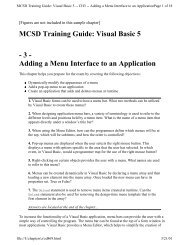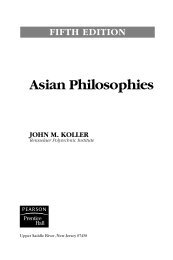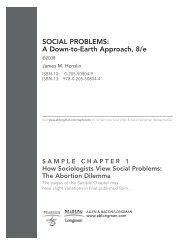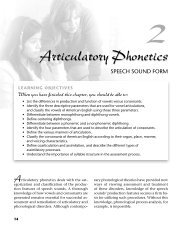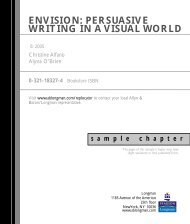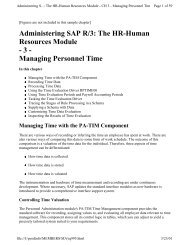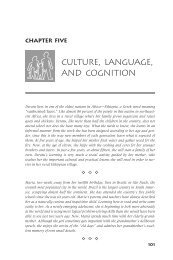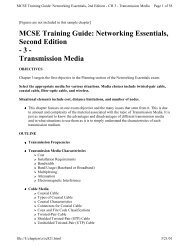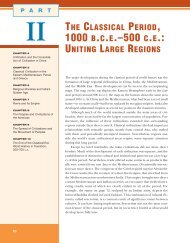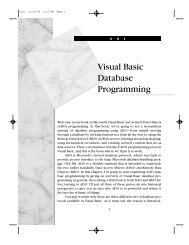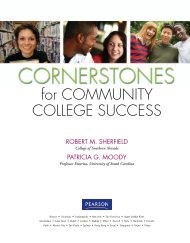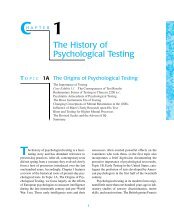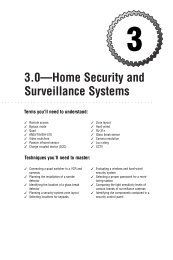The Road to Autonomous Learning
The Road to Autonomous Learning
The Road to Autonomous Learning
Create successful ePaper yourself
Turn your PDF publications into a flip-book with our unique Google optimized e-Paper software.
M01_SELL5722_03_SE_C01.indd Page 15 10/23/13 11:50 AM user-s138<br />
/203/AW00142/9780321885722_SELLERS/SELLERS_ACADEMIC_TRANSFORMATION03_SE_978032188<br />
<strong>The</strong> <strong>Road</strong> <strong>to</strong> Au<strong>to</strong>nomous<br />
<strong>Learning</strong><br />
I don’t know where I’m going, but I’m<br />
making good time.<br />
1<br />
C H A P T E R<br />
CASE STUDY OVERVIEW<br />
Jesse, a scholarship athlete beginning his junior year in college, is struggling<br />
<strong>to</strong> make a potentially life-changing decision. Find out more about Jesse and<br />
the decision he ultimately makes as you read this chapter.<br />
As 21st-century citizens, we are experiencing an increasingly complex and<br />
challenging world. Each year millions choose higher education as a way <strong>to</strong><br />
prepare for the ever-changing future. Yet many have conflicting emotions<br />
about that decision.<br />
“Is it all about grades? I have <strong>to</strong> do well because my family has such high<br />
aspirations for me.”<br />
“I try so hard, but then I blow it on the test.”<br />
“I do really well in a class if the teacher is interesting.”<br />
“How can I juggle all my responsibilities and all these assignments?”<br />
“I know my future is on the line, but I just can’t get motivated.”<br />
QUESTIONS TO FOCUS ON AS<br />
YOU EXPLORE THIS CHAPTER:<br />
• What are the most important<br />
components of your quality<br />
world?<br />
• How can you use the<br />
academic transformation<br />
process <strong>to</strong> become a<br />
successful student?<br />
• What characteristics of<br />
au<strong>to</strong>nomous learners do you<br />
share?<br />
This text shows you how <strong>to</strong> become the collegiate student you wish <strong>to</strong> become—how<br />
<strong>to</strong> academically transform yourself. If you are not quite the student<br />
you wish <strong>to</strong> be, or not nearly the student you wish <strong>to</strong> become, then open<br />
your mind and your heart <strong>to</strong> the messages here. We are learners, <strong>to</strong>o, both as<br />
students and as teachers, and we have walked these roads before. Come with<br />
us, and we will show you what college learning is all about, and how you can<br />
master it.<br />
MyStudentSuccessLab ®<br />
MyStudentSuccessLab is an online solution designed <strong>to</strong> help you acquire and<br />
develop (or hone) the skills you need <strong>to</strong> succeed. You will have access <strong>to</strong> peerled<br />
video presentations and develop core skills through interactive exercises and<br />
projects.<br />
15
M01_SELL5722_03_SE_C01.indd Page 16 10/23/13 11:50 AM user-s138<br />
/203/AW00142/9780321885722_SELLERS/SELLERS_ACADEMIC_TRANSFORMATION03_SE_978032188<br />
16 Chapter 1<br />
Exercise 1.1<br />
SELF-ASSESSMENT: My Willingness <strong>to</strong> Become a<br />
Successful Student<br />
<strong>The</strong> first step in becoming a successful student is <strong>to</strong> assess your openness <strong>to</strong> the changes<br />
college demands. With 5 being “Almost Always” and 1 being “Almost Never,” assess<br />
your readiness for changes you expect this term. Rate each of the following statements<br />
honestly by circling the appropriate number.<br />
Almost<br />
Almost<br />
Always Sometimes Never<br />
1. I am confident about my 5 4 3 2 1<br />
abilities <strong>to</strong> succeed in college.<br />
2. I am ready <strong>to</strong> change some 5 4 3 2 1<br />
of my academic behaviors<br />
and study habits.<br />
3. I get personal satisfaction 5 4 3 2 1<br />
from completing goals.<br />
4. I routinely initiate studying 5 4 3 2 1<br />
when assignments are made.<br />
5. I engage in difficult academic 5 4 3 2 1<br />
tasks without giving up <strong>to</strong>o<br />
easily.<br />
6. I enjoy learning something new. 5 4 3 2 1<br />
7. My grades are a good 5 4 3 2 1<br />
indica<strong>to</strong>r of my abilities.<br />
8. I try <strong>to</strong> think openly about 5 4 3 2 1<br />
issues, even if they conflict<br />
with my ideas.<br />
9. I use different learning 5 4 3 2 1<br />
strategies for different<br />
subjects.<br />
10. I am hopeful about my 5 4 3 2 1<br />
success in college.<br />
Add up the numbers you circled. Your <strong>to</strong>tal score will be between 10 and 50. <strong>The</strong> higher<br />
your score, the more likely you are <strong>to</strong> be open <strong>to</strong> necessary changes. For a score below<br />
30, reflect on the items for which you have concerns and consider talking with a trusted<br />
friend, family member, teacher, counselor, or advisor.<br />
INTRODUCTION<br />
What a joy <strong>to</strong> be human! We have harnessed the physical world; we can reflect on our<br />
feelings. We can understand important aspects of this world, including ourselves. We<br />
can change what we do and how we feel. We can achieve what we wish. Conversely, our<br />
humanness can be a burden—we can be ignorant of the world and ourselves; we can stay<br />
stuck in old ways of being and feeling; we can fail ourselves and fail others.
M01_SELL5722_03_SE_C01.indd Page 17 10/23/13 11:50 AM user-s138<br />
/203/AW00142/9780321885722_SELLERS/SELLERS_ACADEMIC_TRANSFORMATION03_SE_978032188<br />
What makes the difference between these possibilities? It is our basic nature <strong>to</strong><br />
survive, <strong>to</strong> invent, <strong>to</strong> achieve, and <strong>to</strong> change. As humans, our nature is <strong>to</strong> learn, but fear,<br />
greed, and laziness get in the way. Although learning is a basic skill, it must also be<br />
developed.<br />
For tens of thousands of years, the learning process has been a hidden mystery, but<br />
now technology is opening a vision of brain functioning. Each day we are discovering<br />
more about how humans learn and change. We know we have learned something<br />
when we experience a change in our thoughts, feelings, or actions. Those changes are<br />
evidence that we have learned from experiencing new information or circumstances<br />
( Lefrançois, 2000 ). Thus, learning happens continually as we interact with all that is our<br />
environment.<br />
One fact about being human is not a mystery—we can direct our thoughts and feelings<br />
and choose our actions. In other words, we have free will. We exercise that will<br />
within a societal framework of laws and cultural expectations. You may not feel very<br />
free at all, but in a real sense, you are. As authors and teachers, we believe your ability<br />
<strong>to</strong> choose goals and behaviors is foundational <strong>to</strong> becoming a successful student. In every<br />
class, you choose <strong>to</strong> learn or not. You choose what receives your attention and effort.<br />
You choose what you value.<br />
As teachers, we help students set priorities in their lives. Your first priority is <strong>to</strong><br />
determine the life you want <strong>to</strong> have and the person you want <strong>to</strong> be.<br />
A QUALITY WORLD<br />
Humans are the only creatures who can imagine perfection. Media in all its forms illustrates<br />
our yearning for perfection and for the control <strong>to</strong> attain it, but we are inherently<br />
imperfect. Are we ever smart enough, beautiful enough, good enough, fast enough, lovable<br />
enough, successful enough? “Perfectionism is not about healthy achievement and<br />
growth . . . [it is] about trying <strong>to</strong> earn approval and acceptance” ( Brown, 2010 , p. 56 ).<br />
<strong>The</strong> no-man’s-land we can inhabit is between our concept of perfection and our own<br />
state of imperfection. Although “trying <strong>to</strong> be perfect is the most tragic human mistake”<br />
( Kurtz & Ketcham, 1992 , p. 5 ), we are loath <strong>to</strong> relinquish that fantasy. Finding your path<br />
<strong>to</strong> your true goals is the purpose of this chapter.<br />
As humans, we dream of the lives we want—relationships, possessions, accomplishments,<br />
values. That vision is one we begin <strong>to</strong> create from birth. William Glasser<br />
(1998) , a noted American psychiatrist and developer of two important concepts—reality<br />
therapy and choice theory—calls it our quality world . Each of us has mental pictures of<br />
“(1) the people we most want <strong>to</strong> be with, (2) the things we most want <strong>to</strong> own or experience,<br />
and (3) the ideas or systems of belief that govern much of our behavior” (p. 45 ).<br />
Our quality world holds our deepest values and feelings. It holds our hopes for the way<br />
we would like <strong>to</strong> live. Our quality world holds the best ways <strong>to</strong> satisfy one or more of<br />
our basic psychological needs—love/belonging, power, freedom, fun. It is the place<br />
where we would feel completely loved and protected. We care passionately about these<br />
concepts. We look on each new experience—person, thing, or idea—from the perspective<br />
of whether it contributes or detracts from our quality world. Does it move us closer<br />
<strong>to</strong> that world, or farther away?<br />
Even though we move back and forth between the everyday external world and our<br />
quality world numerous times each day, it is rare when we conceptualize, or imagine,<br />
our quality world as a world, a place that holds the summation of our hopes and beliefs.<br />
Every time we think about the perfect mate, the grades we want, the job we desire, or<br />
any one of the dozens of attractive images that come <strong>to</strong> mind, we are thinking about our<br />
quality world. When we experience hope about a relationship, excitement about an idea,<br />
or longing for a possession, we are shaping and reshaping our quality world.<br />
<strong>The</strong> <strong>Road</strong> <strong>to</strong> Au<strong>to</strong>nomous <strong>Learning</strong> 17
M01_SELL5722_03_SE_C01.indd Page 18 10/23/13 11:50 AM user-s138<br />
/203/AW00142/9780321885722_SELLERS/SELLERS_ACADEMIC_TRANSFORMATION03_SE_978032188<br />
18 Chapter 1<br />
Elements of Our Quality World<br />
Our deepest values and feelings. Hope for the way we<br />
would like <strong>to</strong> live.<br />
<strong>The</strong> people <strong>The</strong> things <strong>The</strong> ideas<br />
we most want we most or systems<br />
<strong>to</strong> be with want <strong>to</strong> of belief<br />
own or<br />
experience<br />
that govern<br />
much of our<br />
behavior<br />
Are our quality worlds healthy and good? Not always. An<br />
addict yearns for the next rush; the power hungry fantasize about<br />
exerting their control over others; the selfish long for love without<br />
having <strong>to</strong> love in return; the lazy look for accomplishment<br />
without effort; the greedy want more than their share; the cruel<br />
enjoy the pain of others. As we mature, self-reflection can help<br />
us ascertain how healthy and ethical our quality worlds are. However,<br />
self-reflection in isolation rarely works. We desperately<br />
need feedback from the people and systems we respect and trust.<br />
We should use that feedback, not simply accept it unconditionally.<br />
Our parents cannot design our quality world; neither can our<br />
teachers, peers, preachers, or politicians. It is our job, our responsibility,<br />
<strong>to</strong> build our quality world; it is, according <strong>to</strong> Glasser<br />
(1998) , the core of our life, no one else’s.<br />
<strong>The</strong> generation of Americans born since the 1970’s has a name in the world of social<br />
science; that name is Generation Me ( Twenge, 2006 , p. 3 ).<br />
Generation Me has the highest self-esteem of any generation, but also the most depression.<br />
We are more free and equal, but also more cynical. We expect <strong>to</strong> follow our<br />
dreams, but are anxious about making that happen. In a recent poll, 53% of high school<br />
seniors said that growing up is harder now than it was for their parents ( Twenge, 2006 ,<br />
p. 212 ).<br />
Most, but not all, Generation Me Americans have received powerfully optimistic messages:<br />
You can be anything you want <strong>to</strong> be. Follow your dreams. Be yourself. You may<br />
have heard such messages in the media; at the same time, you may have heard about the<br />
current economic struggles and the intense competition in the job market. You may have<br />
already begun <strong>to</strong> question how all these messages can fit <strong>to</strong>gether.<br />
One good method of sorting out your own feelings and thoughts, the messages from<br />
your family and friends, and the reality of the world is <strong>to</strong> build your own quality world<br />
thoughtfully. Asking yourself what you expect from this college experience can help<br />
you get started. College can be an exhilarating experience if it matches your quality<br />
world; it can be a brutal nightmare if it does not.<br />
Because your quality world drives so many of your fantasies, dreams, goals, and<br />
actions, a crucial decision is whether you will ground it with a value system that is ethical,<br />
balanced, and wise. In this postmodern age in which diverse traditions and systems<br />
are honored, such a decision is complicated and difficult. One example is <strong>to</strong> know where<br />
your rights end and the rights of others begin. For some people, that boundary of selfesteem<br />
is treacherous. You either take advantage of others or allow them <strong>to</strong> take advantage<br />
of you. You may do <strong>to</strong>o much for others and not expect them <strong>to</strong> do much for you.<br />
Balance is a concept we will return <strong>to</strong> again and again in this text. To make wise<br />
choices and then live them is an opportunity that collegiate life provides on a daily basis.<br />
Consciously evaluating those daily choices against your deepest values is the greatest<br />
guarantee that you have <strong>to</strong> build a good life.<br />
CASE STUDY<br />
JESSE earned a football scholarship, an accomplishment that fulfilled his parents’<br />
dreams. <strong>The</strong>y were excited that he was going <strong>to</strong> college, but even more thrilled that he<br />
would play football at the collegiate level. He accepted their vision without question and<br />
dreamed of athletic success. However, reality was shocking. He was no longer the star.<br />
As a freshman, he was not even a starter. Classes were more difficult than in high school,
M01_SELL5722_03_SE_C01.indd Page 19 10/23/13 11:50 AM user-s138<br />
/203/AW00142/9780321885722_SELLERS/SELLERS_ACADEMIC_TRANSFORMATION03_SE_978032188<br />
and he felt he had no time for himself. Academics were forced <strong>to</strong> a backseat as he strived<br />
<strong>to</strong> succeed on the team. Jesse grudgingly kept the vision of athletic success through two<br />
seasons, but he grew <strong>to</strong> understand that the quality world he wanted included academic<br />
as well as athletic achievement. Finally, at the end of his sophomore year, Jesse <strong>to</strong>ld his<br />
parents the truth. He was uncomfortable in the conflict between athletics and academics<br />
and ashamed of his grades. Jesse withdrew in<strong>to</strong> himself the next summer and painfully<br />
pondered what he wanted in his life, now and in the future. Gradually, he came <strong>to</strong> the<br />
conclusion that he wanted a sense of freedom <strong>to</strong> explore new ideas and different types<br />
of people. His competitive spirit was still alive, but now it turned <strong>to</strong> the classroom. He<br />
wanted the ability <strong>to</strong> choose his own priorities, his own actions, his own direction. His<br />
quality world was forming as he thought about the college life he wanted <strong>to</strong> build. He<br />
chose <strong>to</strong> leave athletics and his scholarship, knowing that he would have <strong>to</strong> find a parttime<br />
job for financial support and take student loans <strong>to</strong> finish school. However, that<br />
choice gave him more study time and more energy <strong>to</strong> focus on academics.<br />
<strong>The</strong> <strong>Road</strong> <strong>to</strong> Au<strong>to</strong>nomous <strong>Learning</strong> 19<br />
Questions for Reflection and Discussion<br />
Considering his circumstances, did Jesse make the right choice <strong>to</strong> leave athletics and<br />
give up his scholarship? What would you have done if you were Jesse?<br />
Improving Our Quality World<br />
As teachers for many years, we believe an important life skill is our ability <strong>to</strong> discern<br />
and improve our quality worlds. How does such discernment occur? A crucial aspect of<br />
any such system is reflection , our ability <strong>to</strong> think deeply and carefully about important<br />
issues and their relationship <strong>to</strong> one another. What follows is one method for discernment,<br />
a series of reflective questions in four major arenas of life— relationships, work,<br />
belief, and service (see Figure 1.1 ). As you read these questions, remember that effective<br />
reflection requires openness (being receptive <strong>to</strong> whatever comes in<strong>to</strong> your awareness),<br />
observation (being able <strong>to</strong> step outside yourself as you look at your behaviors and<br />
FIGURE 1.1 <strong>The</strong> Four Major Arenas of Life<br />
Reflection<br />
Belief<br />
Reflection<br />
Service<br />
Quality World<br />
Work<br />
Reflection<br />
Relationships<br />
Reflection
M01_SELL5722_03_SE_C01.indd Page 20 10/23/13 11:50 AM user-s138<br />
/203/AW00142/9780321885722_SELLERS/SELLERS_ACADEMIC_TRANSFORMATION03_SE_978032188<br />
20 Chapter 1<br />
thoughts), and objectivity (the constant awareness that your thoughts and feelings are<br />
temporary and do not represent the <strong>to</strong>tality of who you are) ( Siegel, 2010) .<br />
Relationships. As humans, we are social creatures. Most of us place relationships at<br />
the core of our lives. A significant other, family members, friends, colleagues, roommates—these<br />
are the people with whom we share our lives. We laugh with them, fight<br />
with them, cry with them, celebrate with them, dream with them. <strong>The</strong>re is a tie, a bond,<br />
among us. <strong>The</strong>se are the people who know the truth about us, and they love and care for<br />
us. We know and do the same for them. Trust and safety are at the center of our quality<br />
relationships.<br />
Have you ever asked yourself what are the quality relationships in your life? How<br />
closely does the reality meet the dreams and hopes you have for relationships? Where<br />
are the differences? Are your visions of quality relationships healthy and hopeful? How<br />
do relationships give meaning and purpose <strong>to</strong> your life?<br />
Work. Across all cultures and all times, people work most of their lives. Work<br />
is a major avenue of deriving feelings of productiveness, a basic requirement of<br />
a healthy self-view. As a young child, you began working by going <strong>to</strong> school and<br />
learning. That was your job in your family, although you probably had chores <strong>to</strong> do<br />
as well. School may still be your primary work, even if now you work at a job that<br />
earns you a paycheck. On the other hand, school may take second or third place after<br />
family and your job.<br />
At this time in your life, you probably have several visions of work in your quality<br />
world. One is the vision of how you wish <strong>to</strong> be as a college student—in other<br />
words, what collegiate experiences do you wish <strong>to</strong> have? How will you perform<br />
collegiate work and what feelings will ensue from your efforts? What subsidiary<br />
role does other work play? Another vision is the one you hold of the work you are<br />
currently doing. A vision most of you carry is the work you will do after graduation.<br />
What is your vision of your working career? Where will it occur? What responsibilities<br />
will you have? What do you wish <strong>to</strong> achieve? How does work give meaning and<br />
purpose <strong>to</strong> your life?<br />
Your collegiate work is probably your primary job now. It is important <strong>to</strong> maintain<br />
your professional attitude and work habits at school as well as at work. Show up on time<br />
ready <strong>to</strong> learn with the necessary materials, do not leave early, and put forth your best<br />
efforts on homework and exams. <strong>The</strong> work ethic you create as a student will follow you<br />
in<strong>to</strong> your career.<br />
Belief. All of us believe in something. Whether we believe in the sacred or the secular,<br />
order or chaos, atheism or religion, we all believe. It is human nature <strong>to</strong> try <strong>to</strong> make<br />
sense of our existence. We rely on our families and our culture <strong>to</strong> help us find those<br />
explanations that fill our quality world. As we move from stage <strong>to</strong> stage in life, it is<br />
healthy <strong>to</strong> question those explanations. What are your beliefs? What values do you think<br />
are important? What beliefs give meaning and purpose <strong>to</strong> your life?<br />
Service. A basic tenet of human behavior is that we rely on others as they rely on us.<br />
We are individuals, but we are also part of larger groups. Thus some people are willing<br />
<strong>to</strong> work for the common good by participating in service activities. Obviously, volunteer<br />
work is a service activity, but there are many others as well. Voting, paying taxes, helping<br />
a neighbor or a stranger, contributing <strong>to</strong> a charity, showing patriotism, obeying community<br />
laws—all are service behaviors. Circumstances at particular times in our lives<br />
dictate how much or how often we are willing <strong>to</strong> serve. However, service is one of the<br />
core components of a healthy life, so determining a variety of service behaviors gives us<br />
many more opportunities. What role does service play in your quality world? How does<br />
service give meaning and purpose <strong>to</strong> your life?
M01_SELL5722_03_SE_C01.indd Page 21 10/23/13 11:50 AM user-s138<br />
/203/AW00142/9780321885722_SELLERS/SELLERS_ACADEMIC_TRANSFORMATION03_SE_978032188<br />
<strong>The</strong> concept of a quality world may be new <strong>to</strong> you. We hope you will give it careful<br />
consideration, for we believe that if you carefully and thoughtfully adjust the images<br />
and feelings that constitute your quality world <strong>to</strong> a greater congruence with the life you<br />
realistically desire <strong>to</strong> lead, then your motivation <strong>to</strong> achieve that life will become greater.<br />
Such consideration can encompass difficult choices and sacrifices, as Jesse’s choices<br />
did. However, the reward will be your increased confidence and comfort with the life<br />
you are building.<br />
<strong>The</strong> purpose and strategies of this text rest on your ability <strong>to</strong> choose (and <strong>to</strong> control)<br />
your thoughts, feelings, and behaviors <strong>to</strong> reach carefully selected goals. We will share<br />
how you can increase your ability <strong>to</strong> evaluate your individual academic situation and<br />
plan and execute appropriate action. Becoming a competent student is an individual journey;<br />
you are a unique learner. Our term for your journey is academic transformation.<br />
ACADEMIC TRANSFORMATION<br />
Often humans contemplate what it would be like <strong>to</strong> be different. Fantasy lives are filled<br />
with images of success and acclaim, attractiveness and competence, pleasure and joy—<br />
all without effort or cost. <strong>The</strong> no-man’s-land between fantasy and reality is a hard, barren<br />
place, but we want <strong>to</strong> share with you an oasis in that desert. It is possible for humans<br />
<strong>to</strong> transform themselves, in their thoughts, behaviors, and feelings. It is possible for you<br />
<strong>to</strong> transform yourself, and you can choose carefully exactly how you want <strong>to</strong> change<br />
and what you want <strong>to</strong> become. One enormous advantage you have is the power of habit.<br />
Habits are “the choices that all of us deliberately make at some point, and s<strong>to</strong>p thinking<br />
about but continue doing” ( Duhigg, 2012 , p. xvii). If we create constructive habits, then<br />
the unconscious force of habit makes the chosen behavior easier.<br />
This text focuses on academic transformation — the process by which you become<br />
a more successful student . However, the principles and strategies are easily transferable<br />
<strong>to</strong> other areas of life. Our conviction is that truly successful college students are those<br />
who do more than make a good GPA—they also have fulfilling personal and social<br />
lives, have a clear view of their future professions, develop their physical and spiritual<br />
lives, and participate in their communities. Those standards are challenging for any student,<br />
and they are accomplished within the academic framework of their lives.<br />
This text focuses on your work as a student. Academic transformation is the process<br />
whereby you will carefully assess your current situation as a student, determine specific<br />
short- and long-term academic goals based on your values, chart changes necessary<br />
<strong>to</strong> reach those goals, and then make those changes. Along the way, you must continually<br />
evaluate your progress and make the appropriate adjustments. Even your long-term<br />
goals may change.<br />
Following are some of the reflective questions for each of the six steps of academic<br />
transformation:<br />
Assess your current academic situation. Consider such things as your academic<br />
standing (honor, good, marginal, probation, probationary entrance); scholarship/financial<br />
aid requirements; extracurricular activities (athletics, social or professional<br />
organizations); residence (on-campus, commuting). Are your learning skills (reading,<br />
writing, mathematics, thinking) strong, average, or weak? What is your level of<br />
self-confidence? Of stress or anxiety?<br />
Set short- and long-term academic goals based on your values. What are the<br />
external forces (finances, family, academic requirements) that affect your academic<br />
goals? What are the internal forces—your personal definition of success, your desires<br />
for personal and social activities, your search for the best career—that affect<br />
<strong>The</strong> <strong>Road</strong> <strong>to</strong> Au<strong>to</strong>nomous <strong>Learning</strong> 21
M01_SELL5722_03_SE_C01.indd Page 22 10/23/13 11:50 AM user-s138<br />
/203/AW00142/9780321885722_SELLERS/SELLERS_ACADEMIC_TRANSFORMATION03_SE_978032188<br />
22 Chapter 1<br />
your academic goals? Goals should be specific so that you will know when you<br />
have reached them. Examples could be a GPA for the term, specific grades in each<br />
course, or acceptance in<strong>to</strong> a particular major or program.<br />
Create a list of immediate objectives and an action plan <strong>to</strong> meet them. Examples<br />
of immediate objectives can include reading assignments before class, attending<br />
class regularly, and so on. Action plans may include getting enough sleep, going <strong>to</strong><br />
the library <strong>to</strong> read and study, and using an academic planner <strong>to</strong> set specific study<br />
times.<br />
Work <strong>to</strong> accomplish your objectives. This step is the hardest step. You have <strong>to</strong> do<br />
what you have determined is important. So, use a <strong>to</strong>-do list every day and mark what<br />
you accomplish; encourage yourself <strong>to</strong> follow your plan; ask friends and family <strong>to</strong><br />
support your efforts.<br />
Evaluate your progress. At the end of each day, evaluate what you have done and<br />
create the <strong>to</strong>-do list for the next day. Check completed items in your planner and circle<br />
any items that were not finished; move them <strong>to</strong> the next day. What, if anything,<br />
is blocking your progress? How can you resolve it?<br />
Make adjustments as needed, and repeat. At the beginning of the next week, take<br />
a step back and review. Are your goals and objectives still the same? What challenges<br />
have emerged for this coming week? Do you need <strong>to</strong> seek help from your<br />
instruc<strong>to</strong>rs, study labs or groups, classmates? This time is best used <strong>to</strong> confirm your<br />
accomplishments and chart your tasks for the next week. It is also a good time <strong>to</strong><br />
reflect on your personal and social goals.<br />
In this text we introduce you <strong>to</strong> the research, theories, and practices that form the<br />
foundation for the steps of academic transformation, and the process will become habitual<br />
because you will do it again and again. You may already have strengths in certain<br />
areas, such as goal setting, and may want <strong>to</strong> improve your ability <strong>to</strong> create action plans.<br />
Conversely, you may have the motivation <strong>to</strong> work hard but have difficulty knowing the<br />
best methods of working <strong>to</strong> meet your goals. <strong>The</strong> questions at the end of this chapter will<br />
help you begin <strong>to</strong> master this process.<br />
BECOMING AN AUTONOMOUS LEARNER<br />
An excellent example of academic transformation is a student’s gradual movement from<br />
a teacher-directed learner <strong>to</strong> an au<strong>to</strong>nomous learner . Early educational experiences<br />
are teacher directed. Teachers expect students <strong>to</strong> learn by following the teacher’s assignments<br />
and directions. Students are rarely required <strong>to</strong> set their own learning goals or deviate<br />
from given guidelines. <strong>The</strong>y view the teacher as the source of the right answers—the<br />
authority ( Weinstein, 1988 ). <strong>The</strong>se students write down what the teacher presents, usually<br />
word for word. <strong>The</strong>y read the text assignment, and they often use rote memory <strong>to</strong><br />
answer test questions. <strong>The</strong>y depend on the teacher <strong>to</strong> make connections. <strong>The</strong> result is<br />
that procrastination and boredom are frequent companions.<br />
Although this attitude and these behaviors are frequently sufficient for high<br />
school, they can be deadly in college. Beginning college students often exert real<br />
effort in their courses, but when they try hard and use the behaviors that have worked<br />
well in the past, they can become confused when the results are disappointing. It is<br />
common <strong>to</strong> hear students say, “I studied harder for that test than I have ever studied<br />
before, and I failed it! I don’t know what <strong>to</strong> do.” <strong>The</strong>y are being called <strong>to</strong> become<br />
au<strong>to</strong>nomous learners, but no professor uses that term. It is a secret password <strong>to</strong> college<br />
success.
M01_SELL5722_03_SE_C01.indd Page 23 10/23/13 11:50 AM user-s138<br />
/203/AW00142/9780321885722_SELLERS/SELLERS_ACADEMIC_TRANSFORMATION03_SE_978032188<br />
From our experience as teachers, we have come <strong>to</strong> believe deeply in the concept of<br />
the au<strong>to</strong>nomous learner as a person independently competent in a wide variety of academic<br />
tasks, able <strong>to</strong> actively achieve goals based on values, and skilled in self-reflection.<br />
We have identified seven important characteristics of students who are consistently successful<br />
in a collegiate environment. As you read the following explanations of the seven<br />
characteristics, evaluate how much of each you have already acquired.<br />
1. Au<strong>to</strong>nomous learners have a realistic view of themselves and their academic abilities.<br />
Can you separate fact from fantasy and reality from wishful thinking about yourself?<br />
Such clear thinking is a major psychological goal as you move from adolescence <strong>to</strong><br />
adulthood. An emotionally healthy and realistic self-concept is foundational <strong>to</strong> the effort<br />
of reflection, evaluation, and acceptance of your academic abilities.<br />
Where would you place your academic self-concept?<br />
Fantasy-based ‹—————————————————————————› Reality-based<br />
2. Au<strong>to</strong>nomous learners are ethical. A healthy self-awareness leads <strong>to</strong> a clear understanding<br />
of your own values and ethics. Simply believing in a principle is insufficient;<br />
living by your values and beliefs is essential <strong>to</strong> a healthy self-concept. When you are a<br />
student, academics is your work. Academic honesty and integrity are important components<br />
of your successful college career, and they are the method by which you develop<br />
your system of professional ethics. If you cheat on college tests or papers, then you are<br />
likely <strong>to</strong> cheat in relationships or at work.<br />
Where would you place your academic behavior?<br />
Unethical ‹——————————————————————————————› Ethical<br />
3. Au<strong>to</strong>nomous learners set realistic and appropriate goals for academic achievement.<br />
Few abilities are as crucial as that of setting realistic and appropriate goals for<br />
any endeavor, and academics is no exception <strong>to</strong> that premise. A goal can be as large as<br />
graduation or a term GPA, or it can be as immediate as planning <strong>to</strong> study his<strong>to</strong>ry for one<br />
hour <strong>to</strong>night. To set realistic academic goals when there are other legitimate goals in<br />
your personal, family, social, work, and physical life may be a difficult skill for you <strong>to</strong><br />
master. Balance is the elusive goal for which we strive; the closer we get <strong>to</strong> balance, the<br />
closer we will come <strong>to</strong> the good life.<br />
Where would you place your ability <strong>to</strong> set realistic and appropriate academic goals?<br />
Poor ‹—————————————————————————————————› Good<br />
4. Au<strong>to</strong>nomous learners understand their own learning strengths and weaknesses. To<br />
set realistic and effective academic goals, you must know your own learning strengths<br />
and weaknesses. For example, if you are a slow reader, then you will have <strong>to</strong> allocate<br />
more uninterrupted time <strong>to</strong> your assignments than your roommate who is a skilled<br />
reader. Through accurate academic self-assessment, you can choose the best major, the<br />
best term schedule, and the best learning strategies.<br />
How would you rate your awareness of your learning strengths and weaknesses?<br />
Poor ‹—————————————————————————————————› Good<br />
5. Au<strong>to</strong>nomous learners manage their behaviors <strong>to</strong> reach their goals. Having<br />
appropriate goals and knowing the best strategies are meaningless unless you do the<br />
behaviors <strong>to</strong> learn. In other words, you have <strong>to</strong> work at being a student in a timely<br />
way. Procrastination and avoidance can destroy academic achievement, so you must<br />
<strong>The</strong> <strong>Road</strong> <strong>to</strong> Au<strong>to</strong>nomous <strong>Learning</strong> 23
M01_SELL5722_03_SE_C01.indd Page 24 10/23/13 11:50 AM user-s138<br />
/203/AW00142/9780321885722_SELLERS/SELLERS_ACADEMIC_TRANSFORMATION03_SE_978032188<br />
24 Chapter 1<br />
learn how <strong>to</strong> control your own actions. Good work habits will make the entire process<br />
so much easier.<br />
How well do you manage your academic behaviors?<br />
Unproductive ‹—————————————————————————————› Productive<br />
6. Au<strong>to</strong>nomous learners use effective learning strategies and adapt those strategies <strong>to</strong> new<br />
situations. Hundreds of learning strategies are available for use, but choosing the most<br />
effective way <strong>to</strong> study a particular subject at a particular time is a skill acquired by reflection<br />
and practice. <strong>The</strong> common metaphor for this skill is a <strong>to</strong>olbox —a reference <strong>to</strong> the idea that<br />
a competent student creates a collection of strategies that you use appropriately in different<br />
situations, depending on your goals, situation, and abilities. You can enhance and expand<br />
your current collection of strategies through the various ideas and examples in this text.<br />
How would you rate your ability <strong>to</strong> appropriately vary your learning strategies?<br />
Poor ‹—————————————————————————————————› Good<br />
7. Au<strong>to</strong>nomous learners use appropriate resources in a timely way. Teachers, study<br />
groups, tu<strong>to</strong>ring programs, websites, databases, library resources, other students, and<br />
many other resources exist for any course, and successful students use them promptly<br />
and efficiently. Do you know when you need academic help? Do you seek it out quickly?<br />
Do you persist until you have learned what you need <strong>to</strong> learn? College is so much harder<br />
than high school, so it is wise <strong>to</strong> get help before falling <strong>to</strong>o far behind. An au<strong>to</strong>nomous<br />
learner is also successful in collaborative processes. Modern professional life relies on<br />
the abilities of people <strong>to</strong> work <strong>to</strong>gether <strong>to</strong> solve problems and create effective solutions;<br />
thus, learning <strong>to</strong> participate in learning groups and teams during college will provide<br />
effective <strong>to</strong>ols for later success.<br />
How effectively do you use resources?<br />
Rarely ‹————————————————————————————————› Often<br />
SUMMARY<br />
Dreams, accomplishments, values, beliefs, and relationships<br />
shape your quality world, and you use the process<br />
of reflection <strong>to</strong> examine and make it uniquely yours.<br />
Academic transformation is your opportunity <strong>to</strong> re-create<br />
your academic quality world and enhance your chances of<br />
academic success in college. Ultimately, you can become<br />
an au<strong>to</strong>nomous learner. We hope that you will engage in<br />
a serious reflection of these concepts as they apply <strong>to</strong> you<br />
through your completion of the Thinking Critically sections<br />
following the Key Concepts sections . Simply reading<br />
an idea has little or no effect on us unless we make the<br />
effort <strong>to</strong> relate that idea <strong>to</strong> our own thoughts, feelings, and<br />
behaviors. Here is your chance <strong>to</strong> make these concepts<br />
meaningful.<br />
As teachers and students, we have come <strong>to</strong> understand<br />
that competency as a college student can be<br />
learned. <strong>The</strong> learning skills in this text grow from what<br />
we now understand about our brains—how we learn,<br />
know, think, and feel. We invite you <strong>to</strong> journey with<br />
us as we explore cognitive and behavioral psychology,<br />
personality theory, and concepts from philosophy and<br />
business.<br />
KEY CONCEPTS<br />
Academic transformation<br />
Au<strong>to</strong>nomous learner<br />
Balance<br />
Quality World<br />
Reflection<br />
Teacher-directed learner
M01_SELL5722_03_SE_C01.indd Page 25 10/23/13 11:50 AM user-s138<br />
/203/AW00142/9780321885722_SELLERS/SELLERS_ACADEMIC_TRANSFORMATION03_SE_978032188<br />
<strong>The</strong> <strong>Road</strong> <strong>to</strong> Au<strong>to</strong>nomous <strong>Learning</strong> 25<br />
THINKING CRITICALLY<br />
Each chapter in this text will give you the opportunity<br />
<strong>to</strong> practice your thinking skills. This first Thinking<br />
Critically section focuses on sharpening your skills in<br />
personal reflection, the skill of thinking deeply and carefully<br />
about yourself. Reflection rests on three attitudes:<br />
openness, observation, and objectivity.<br />
• Openness is the willingness <strong>to</strong> receive any information<br />
or insight about yourself without denial or rejection.<br />
To do this, you must temporarily put aside your<br />
feelings of how you want something <strong>to</strong> be and accept<br />
what comes, whether you agree or not. Being open<br />
means that you can sense things clearly.<br />
• Observation is the ability <strong>to</strong> perceive yourself in the<br />
moment—in other words, you are aware of yourself<br />
as you are doing/experiencing something. Observation<br />
can allow you <strong>to</strong> disengage from habitual<br />
behaviors that impede your growth.<br />
• Objectivity is the ability <strong>to</strong> stand outside a thought<br />
or feeling—<strong>to</strong> be aware of what your mind is doing<br />
and realize that those thoughts and feelings are temporary.<br />
<strong>The</strong>y represent a part of who you are, but not<br />
the <strong>to</strong>tality of you ( Siegel, 2010 ).<br />
<strong>The</strong> following questions give you the opportunity <strong>to</strong><br />
practice reflection. Our recommendation is <strong>to</strong> carefully<br />
choose one and create a response. At the collegiate level,<br />
such responses should be at least 250 words. Read, think,<br />
write, and then edit your work. Your instruc<strong>to</strong>r will look<br />
for the demonstration of reflection in your response.<br />
1. Describe your academic strengths and weaknesses as<br />
a learner, particularly in relation <strong>to</strong> reading, writing,<br />
mathematics, and critical thinking. Be as specific as<br />
possible by citing previous experiences, courses, and<br />
grades. What concerns do you have about beginning<br />
this term?<br />
2. Choose one of the four arenas—relationships, work,<br />
belief, service. Describe an example that illustrates a<br />
positive aspect you are happy <strong>to</strong> have in your world.<br />
<strong>The</strong>n describe an example that you believe is not<br />
how you want <strong>to</strong> live. What changes can you make<br />
in the second example?<br />
3. An excellent example of academic transformation<br />
is a student’s gradual movement from a teacher-directed<br />
learner <strong>to</strong> an au<strong>to</strong>nomous learner. Now that<br />
you have read this chapter, define “academic transformation”<br />
in your own words. What types of transformation<br />
would you consider important for yourself<br />
during this period in your academic pursuits? Why?<br />
4. Review the list of seven characteristics of an au<strong>to</strong>nomous<br />
learner. Which characteristics have you successfully<br />
achieved? Which are you willing <strong>to</strong> work<br />
<strong>to</strong>ward achieving? Explain.<br />
5. What preparations did you make before you came <strong>to</strong><br />
college that assist you in being a successful student?<br />
What do you wish you had done differently <strong>to</strong> prepare<br />
yourself? Why?<br />
<strong>The</strong> Last Word<br />
This text began 40 years ago when I walked in<strong>to</strong> a classroom of 20 unsuspecting freshmen<br />
who wanted <strong>to</strong> be successful in college. I had always been a successful student, but<br />
at that moment I realized I didn’t know how <strong>to</strong> teach anyone how <strong>to</strong> do it. Thanks <strong>to</strong> all<br />
those students who went with me down paths of discovery as I figured things out.<br />
—De Sellers
M01_SELL5722_03_SE_C01.indd Page 26 10/23/13 11:50 AM user-s138<br />
/203/AW00142/9780321885722_SELLERS/SELLERS_ACADEMIC_TRANSFORMATION03_SE_978032188




